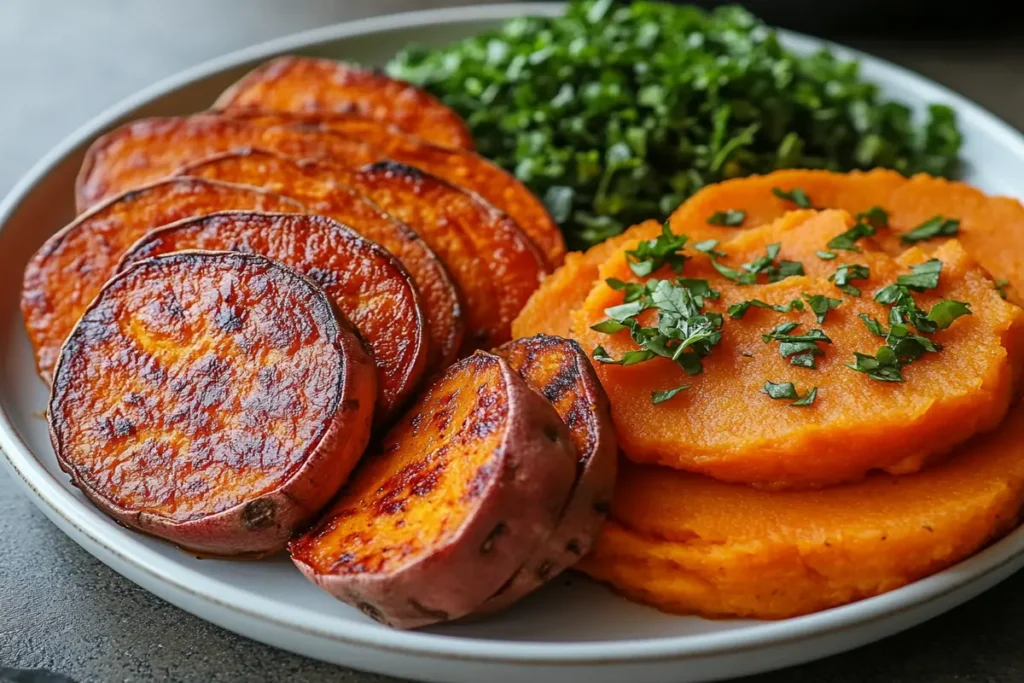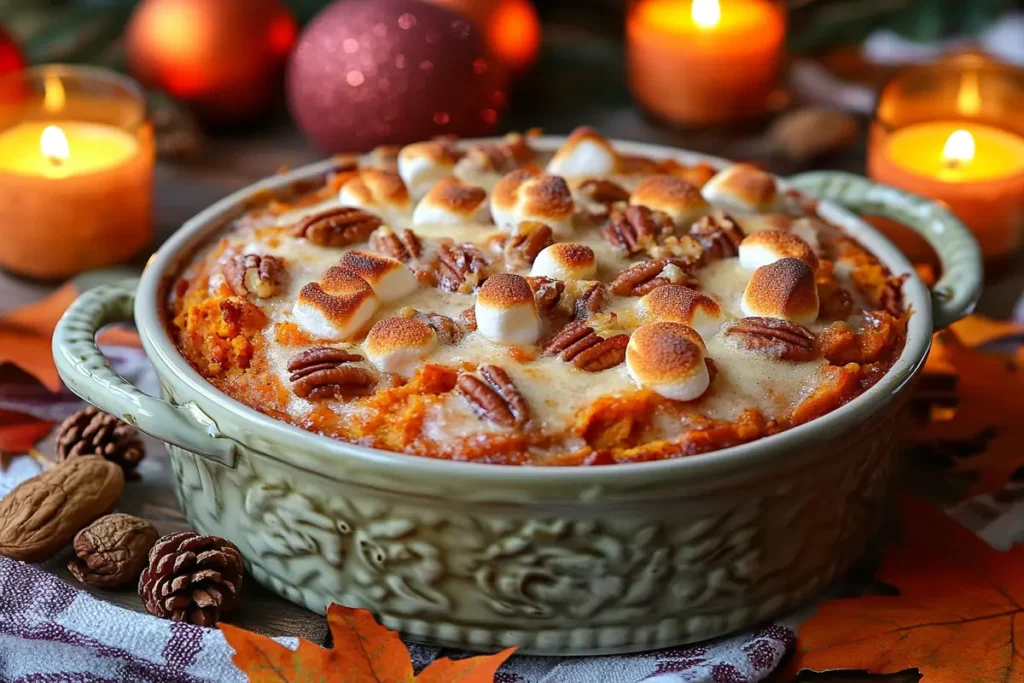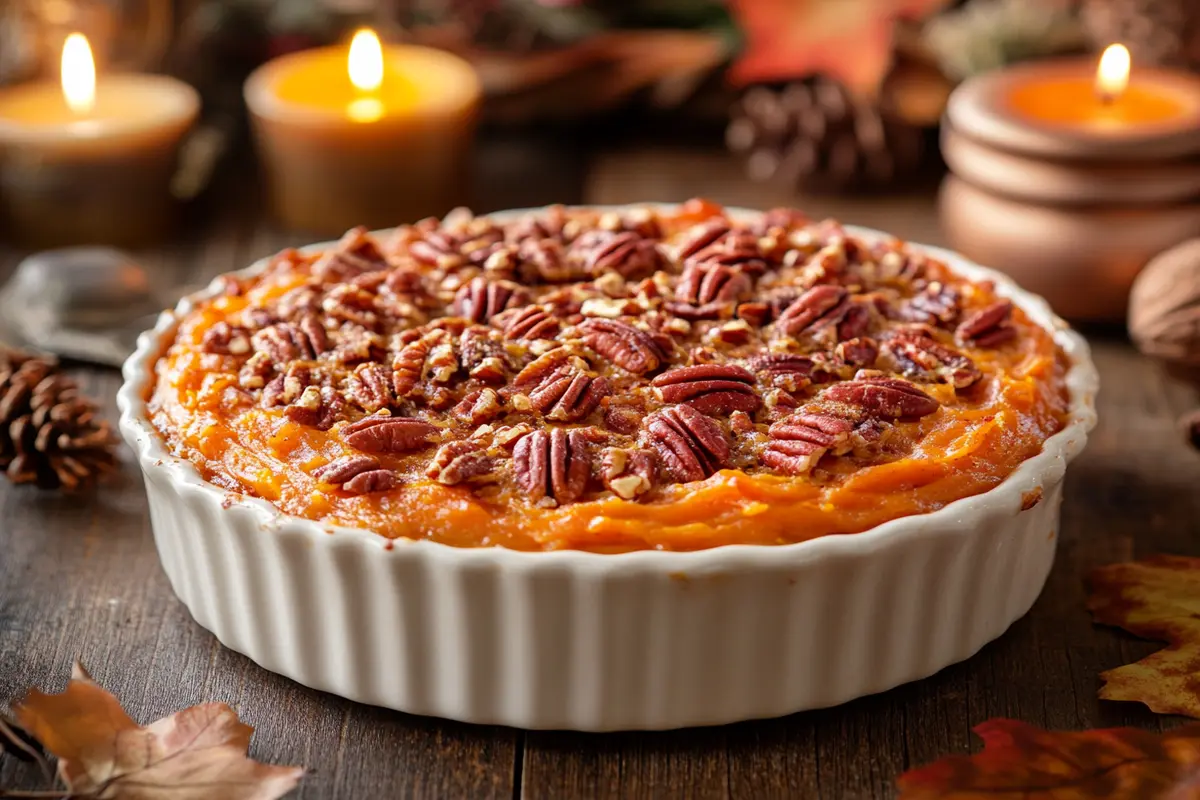Sweet potato casserole is a dish loved by many, especially during festive seasons. It’s versatile, nutritious, and its natural sweetness blends perfectly with savory or sugary toppings. However, one common question often arises when preparing this dish: is it better to bake or boil sweet potatoes for a casserole?
This article will dive deep into the pros and cons of baking and boiling sweet potatoes, helping you decide which method works best for your casserole. Whether you value texture, flavor, or nutrition, knowing whether to bake or boil sweet potatoes can elevate your casserole game to the next level. Let’s start by exploring why sweet potatoes are so perfect for casseroles.
Table of Contents
Why Sweet Potatoes Are Perfect for Casseroles
Sweet potatoes are a star ingredient when it comes to casseroles. Their natural sweetness, creamy texture, and vibrant color make them a versatile and nutritious base for many recipes. Whether you’re preparing a classic Thanksgiving dish or a comforting weeknight meal, sweet potatoes can shine in any casserole. Let’s explore why they’re so ideal for this type of dish.
Nutritional Benefits of Sweet Potatoes
Sweet potatoes are not only delicious but also incredibly nutritious. They’re packed with vitamins, minerals, and antioxidants that make them a healthy addition to your meals. Some of the key benefits include:
- Rich in Vitamin A: Sweet potatoes are one of the best sources of beta-carotene, which your body converts into Vitamin A. This nutrient supports healthy vision, skin, and immune function.
- Good Source of Fiber: The fiber in sweet potatoes helps improve digestion and keeps you feeling full longer. This makes them a satisfying ingredient in casseroles.
- Low in Calories: Sweet potatoes are naturally low in calories, which means you can enjoy a hearty casserole without worrying too much about overindulging.
- Packed with Potassium: This mineral helps regulate blood pressure and supports overall heart health.
By using sweet potatoes in your casserole, you’re not just creating a tasty dish but also adding a boost of nutrients to your diet.
How Sweet Potatoes Enhance a Casserole’s Flavor
One of the reasons sweet potatoes work so well in casseroles is their unique flavor. They’re naturally sweet, with earthy undertones that pair beautifully with a variety of ingredients. Whether you’re adding marshmallows, pecans, or savory spices, sweet potatoes act as the perfect canvas for these flavors to shine.
Here are a few ways sweet potatoes enhance a casserole:
- Sweet and Savory Balance: Sweet potatoes strike the perfect balance between sweet and savory, making them a flexible ingredient. You can prepare them with brown sugar and cinnamon for a dessert-like dish or combine them with garlic and herbs for a savory option.
- Creamy Texture: When cooked, sweet potatoes become soft and creamy, creating a smooth base for your casserole. This texture makes it easy to layer or mash them, depending on your recipe.
- Colorful Presentation: The vibrant orange color of sweet potatoes makes any casserole visually appealing. They can brighten up your table, especially during holidays and celebrations.
Sweet potatoes bring both flavor and nutrition to your casserole, but how you cook them can significantly impact the final dish. Let’s compare the two main cooking methods—baking and boiling.
Baking vs. Boiling Sweet Potatoes: The Basics
When preparing sweet potatoes for a casserole, the cooking method you choose—baking or boiling—can have a significant impact on the final dish. Each method has its own advantages and drawbacks, and understanding how they affect the sweet potatoes will help you make the best choice for your casserole.
What Happens When You Bake Sweet Potatoes?
Baking sweet potatoes involves cooking them in the oven, usually at a temperature between 375°F and 425°F. This method uses dry heat, which allows the sweet potatoes to cook evenly and intensify their natural sweetness. Here’s what happens when you bake sweet potatoes:
- Concentration of Flavors: Baking removes excess water from the sweet potatoes, which concentrates their flavors and sweetness. This can add a rich, caramelized taste to your casserole.
- Firm Texture: Baked sweet potatoes maintain a firmer texture, making them ideal for recipes that require sliced or cubed pieces.
- Skin Softening: If you bake sweet potatoes with their skins on, the skin becomes tender and easy to peel after cooking. This also helps preserve nutrients during the cooking process.
While baking takes longer than boiling, it’s a great method for bringing out the sweet potato’s natural flavors and creating a rich base for your casserole.
What Happens When You Boil Sweet Potatoes?
Boiling sweet potatoes involves cooking them in a pot of water until they become soft. This is a faster cooking method and often used when the sweet potatoes will be mashed or pureed. Here’s what happens when you boil sweet potatoes:
- Moisture Absorption: Sweet potatoes absorb water during boiling, which can result in a softer and wetter texture. This makes them easy to mash or blend for a smooth casserole base.
- Mild Flavor: Boiling doesn’t concentrate the sweet potato’s natural sweetness as much as baking does. The result is a milder flavor, which can be adjusted with added seasonings.
- Nutrient Loss: Some water-soluble nutrients, like Vitamin C and certain B vitamins, can leach into the cooking water during boiling. However, this loss is relatively minor and doesn’t significantly reduce the overall nutritional value.
Boiling is a quick and efficient method, especially if you’re short on time or planning to create a creamy casserole.
Now that we’ve covered the basics of both methods, let’s dive deeper into their pros and cons.
Pros and Cons of Baking Sweet Potatoes for a Casserole
Baking sweet potatoes has its own set of advantages and disadvantages. Let’s take a closer look at why this method might—or might not—be the best choice for your casserole.
Advantages of Baking Sweet Potatoes
- Enhanced Sweetness: Baking intensifies the natural sugars in sweet potatoes, giving them a caramelized, rich flavor. This is especially great for casseroles with sweet toppings like marshmallows or brown sugar.
- Dryer Texture: The dry heat of the oven removes excess moisture, resulting in a firmer texture. This makes baked sweet potatoes ideal for casseroles that require defined layers or slices.
- No Water Absorption: Because baking doesn’t involve water, the sweet potatoes retain more of their natural flavors and nutrients.
- Minimal Nutrient Loss: Baking preserves most of the vitamins and minerals, especially when the skin is left on during cooking.
Disadvantages of Baking Sweet Potatoes
- Longer Cooking Time: Baking takes significantly longer than boiling. Depending on the size of the sweet potatoes, it can take 45–60 minutes.
- Requires an Oven: If you don’t have access to an oven or want to avoid heating up your kitchen, baking may not be the most convenient option.
- Risk of Over-Browning: If left in the oven for too long, sweet potatoes can over-brown, which might affect the flavor and texture of your casserole.
Pros and Cons of Boiling Sweet Potatoes for a Casserole
Boiling sweet potatoes is a faster and more common method, but it comes with its own set of benefits and drawbacks.
Advantages of Boiling Sweet Potatoes
- Faster Cooking Time: Boiling sweet potatoes takes only about 15–20 minutes, making it a great option when you’re short on time.
- Soft and Creamy Texture: Boiled sweet potatoes are softer and wetter, which makes them easy to mash or puree. This is ideal for smooth and creamy casseroles.
- Energy Efficient: Unlike baking, boiling doesn’t require preheating or long cooking times, so it can save energy.
- Uniform Cooking: Boiling ensures that the sweet potatoes cook evenly, which can simplify preparation for your casserole.
Disadvantages of Boiling Sweet Potatoes
- Loss of Flavor: Boiling can dilute the natural sweetness and flavor of sweet potatoes, as some of their sugars leach into the water.
- Nutrient Loss: Water-soluble vitamins, like Vitamin C and some B vitamins, may be lost during boiling. While this loss isn’t drastic, it’s something to consider if you want to maximize the nutritional value of your casserole.
- Soggy Texture: Because boiled sweet potatoes absorb water, they can sometimes become overly soft or soggy, which might affect the final consistency of your casserole.
Now that we’ve covered the pros and cons of both methods, let’s examine how each cooking technique impacts the texture, flavor, and nutritional value of sweet potato casseroles.
How Cooking Methods Impact Sweet Potato Casseroles
The cooking method—baking or boiling—affects your casserole’s texture, flavor, and nutrition.
- Texture: Baking creates a firmer texture, ideal for layering. Boiling produces a softer, creamier consistency, perfect for mashing.
- Flavor: Baking caramelizes sugars, enhancing sweetness. Boiling results in a milder flavor but allows other ingredients to shine.
- Nutrition: Baking preserves more nutrients, especially when the skin is left on. Boiling may lead to some nutrient loss but remains a healthy option.
Choose the method that best matches your desired texture, flavor, and nutritional goals for your casserole.

Choosing the Best Method for Your Sweet Potato Casserole
The best cooking method for sweet potatoes depends on your recipe and preferences. Both baking and boiling have unique benefits.
When to Choose Baking
Baking is ideal if:
- You Want More Sweetness: Baking caramelizes sugars for a richer flavor.
- You Need a Firm Texture: Perfect for layered or cubed casseroles.
- You Have Time: Baking takes longer but enhances flavor and preserves nutrients.
When to Choose Boiling
Boiling works best when:
- You Need a Smooth Texture: Great for mashing or pureed casseroles.
- You’re Short on Time: Boiling is quicker than baking.
- You Want Simplicity: Ideal for bold-flavored recipes where sweet potato flavor is secondary.
Both methods can work together—boil for softness, then bake for flavor! Choose the method that suits your time and the texture you prefer for your casserole.

Frequently Asked Questions
Is It Better to Bake or Boil Sweet Potatoes for a Casserole?
Baking Sweet Potatoes: Flavorful and Nutritious
Baking caramelizes the natural sugars, enhancing flavor and retaining more nutrients. Check out this Easy Sweet Potato Casserole recipe for tips.
Boiling Sweet Potatoes: Quick and Soft
Boiling is faster and ideal for creamy textures, but some nutrients are lost in the water. Reuse the water in soups or stews for recovery. Learn more about balancing flavors with this Cheesy Ground Beef and Rice Casserole Recipe.
Can You Combine Both Methods?
Yes! Boil to soften, then bake to caramelize. For a similar tip, see Should Peppers Be Precooked Before Stuffing?.
Do Sweet Potatoes Lose Nutrients When Cooked?
Baking preserves nutrients better than boiling. See this Cream of Broccoli Soup Recipe for ideas on nutrient-rich cooking.
Conclusion
So, is it better to bake or boil sweet potatoes for a casserole? The answer depends on your needs and preferences. Baking enhances natural sweetness and preserves nutrients, making it ideal for casseroles that require a firm texture or bold flavor. Boiling, on the other hand, is quicker and perfect for creating a creamy, smooth base for your dish.
Both methods have their advantages, and you can even combine them to achieve the best results. Whether you bake or boil sweet potatoes, they’re guaranteed to elevate your dish into a flavorful and nutritious masterpiece. Experiment with both techniques to find what works best for your favorite recipes!

